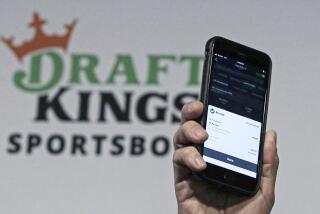An NFL apparel conspiracy?
- Share via
While fans were fixated on the National Football League playoffs -- in which, by definition, the participating teams are competitors -- the Supreme Court was weighing whether on-field enemies can be allies in an economic conspiracy. Last week, the justices heard from a spurned sportswear manufacturer arguing that an exclusive contract with a rival company is a violation of antitrust laws. The court will fumble if it complies.
American Needle Inc. used to be one of several companies that provided souvenir sportswear for NFL teams. But it lost its franchise when the league reached an exclusive contract with Reebok in 2000 to manufacture caps bearing team logos. American Needle wants a trial to prove that the NFL is an alliance of separately owned teams subject to a federal antitrust law prohibiting monopolies and contracts or conspiracies “in restraint of trade and commerce.”
The dispute has attracted unusual attention not only because of its connection to professional sports -- how many cases can be featured on both ESPN and C-SPAN? -- but also because a decision could extend beyond arrangements for the sale of caps and sweat shirts. Players fear the NFL’s argument that it is a single economic entity could be used to prevent them from negotiating with individual teams for salaries and benefits. But that doesn’t follow automatically from a decision in favor of the NFL in this case.
In reality, the NFL is a hybrid. For purposes of competition on the playing field, it is a group of separate actors and, although there is some revenue sharing, one team can be richer than another. For purposes of marketing and ancillary activities such as the promotion of sportswear, it is a joint venture that functions as one businessand can’t be fairly accused of restraining trade between its members. NFL teams may be competitors on the field, but they are not in serious competition for the dollars of sports fans
At oral argument, Justice Stephen G. Breyer -- a former Harvard professor who is apparently a baseball, not a football, fan -- made the point pithily: “I don’t know a Red Sox fan who would take a Yankees sweat shirt if you gave it away.” But the Reebok contract isn’t the only example of football teams collaborating instead of competing. Justice Samuel A. Alito Jr. pointed out that the NFL teams agree among themselves on scheduling.
American Needle insists that it simply wants a trial on its allegations against the league, an argument to which some justices clearly were sympathetic. But the federal judicial system, for good reason, allows courts to dismiss lawsuits at an early stage when no amount of evidence or testimony can affect the legal conclusion. As long as the issue is caps and T-shirts, the Supreme Court should recognize that in pro football, my opponent is sometimes my partner.
More to Read
Go beyond the scoreboard
Get the latest on L.A.'s teams in the daily Sports Report newsletter.
You may occasionally receive promotional content from the Los Angeles Times.










